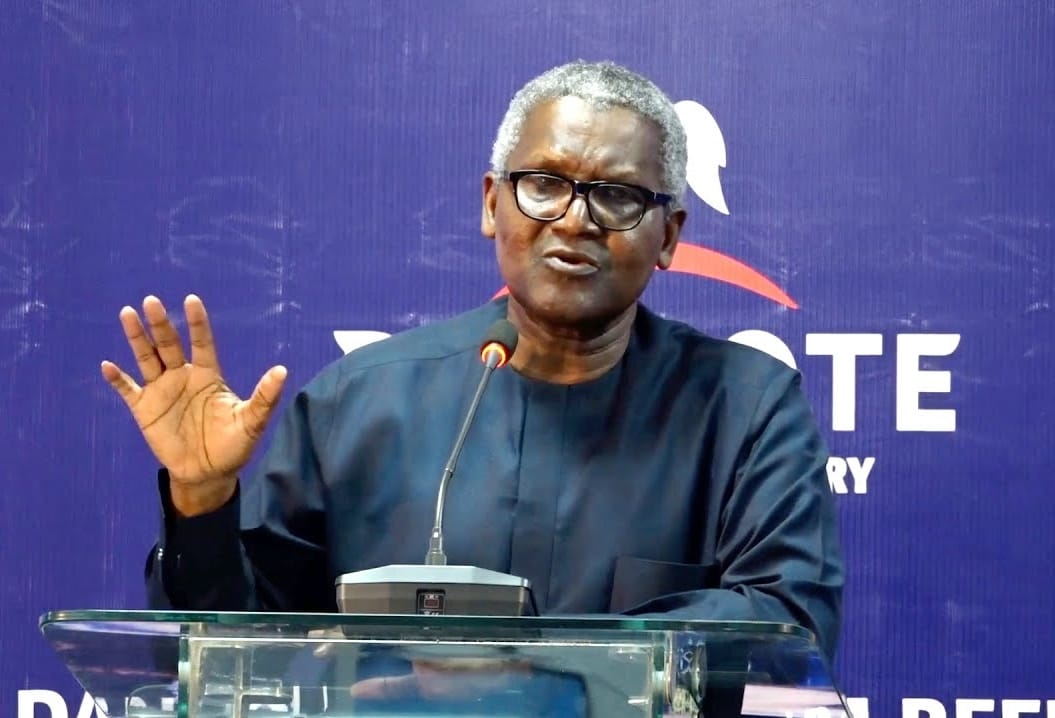Headlines
Dangote Refinery Launches Petrol with Quality Comparable to American Standards- VIDEO

Discover how Dangote Refinery sets a new standard in fuel production, offering petrol that meets the same high quality as American products.
On Tuesday, Dangote Refinery produced its initial Premium Motor Spirit (PMS), commonly referred to as petrol, from their facility that produces 650,000 barrels per day. This production comes more than a year after the refinery was launched in May of 2023.
Nigerian billionaire businessman, Aliko Dangote, announced at a press conference held in Lagos that it is “a day of celebration” for Nigerians.
He promised the citizens that they would have access to high-quality petrol, which will increase the lifespan of their vehicles’ engines. He reassured them that engine problems, which many people faced before, would no longer occur.
Dangote asserted that the quality offered here will equal anywhere in the world – be it USA or America, we are committed to ensuring unbeatable levels of excellence.
As soon as the refinery owner completes the necessary arrangements with Nigerian National Petroleum Company Limited (NNPCL), their product will be available on the market.
Once we reach a final agreement with the NNPCL, our product will be introduced to the market.
He stated that they would aid in the revival of industry and manufacturing, by implementing genuine import substitution methods. This will save foreign exchange and boost earnings while subsequently stabilizing the naira; this strategy can effectively reduce inflation rates as well as cost of living expenses.
In December of last year, Dangote – the foremost industrialist in Africa – inaugurated his $20 billion facility located in Lagos. The plant is capable of producing 350,000 barrels a day.
By year-end, the refinery aims to reach its maximum production capacity of 650,000 barrels per day after facing regulatory conflicts in its earlier stages.
READ ALSO: Dangote Petrol Ready for Rollout
The supply of diesel and aviation fuel to marketers in the country has commenced at the refinery, followed by petrol.
Challenge of NNPCL Debt
The Dangote Refinery’s launch of its petrol offering came in response to the NNPCL’s acknowledgment that it holds considerable debt with fuel suppliers, indicating a possible risk to maintaining sustainable fuel supply.
According to reports, the petrol scarcity in Nigeria – an ongoing issue since early 2024 – has been exacerbated by the NNPCL’s outstanding debt of $6 billion owed to petrol suppliers.
The NNPCL pointed to various reasons, such as logistics difficulties and flooding, for the scarcity of the crucial commodity at different times.
The NNPCL spokesperson, Olufemi Soneye, declared in a statement on Sunday that the financial burden has become overwhelming for the company and could potentially jeopardize its ability to maintain fuel supply sustainably.
The energy situation in Nigeria, the most populated country in Africa, presents substantial obstacles considering none of its state-owned refineries are functioning. To make matters worse, the nation is heavily dependent on imported refined petroleum products and relies primarily on NNPC as a critical importer for such commodities.
Fuel queues have become a regular occurrence within the country as petrol prices tripled since May 2023 when subsidy removal kicked in, rising from approximately ₦200/litre to around ₦800/litre. This has resulted in added challenges for citizens who rely on gasoline-operated vehicles and power generators due to persistent issues with electricity supply over decades.
With the government’s decision to combine forex windows, the value of the naira plummeted drastically from $1/₦700 to more than $1/₦1600 in the parallel market. As a result, Nigerians grappled with skyrocketing prices for food and essential goods due to inflation.
